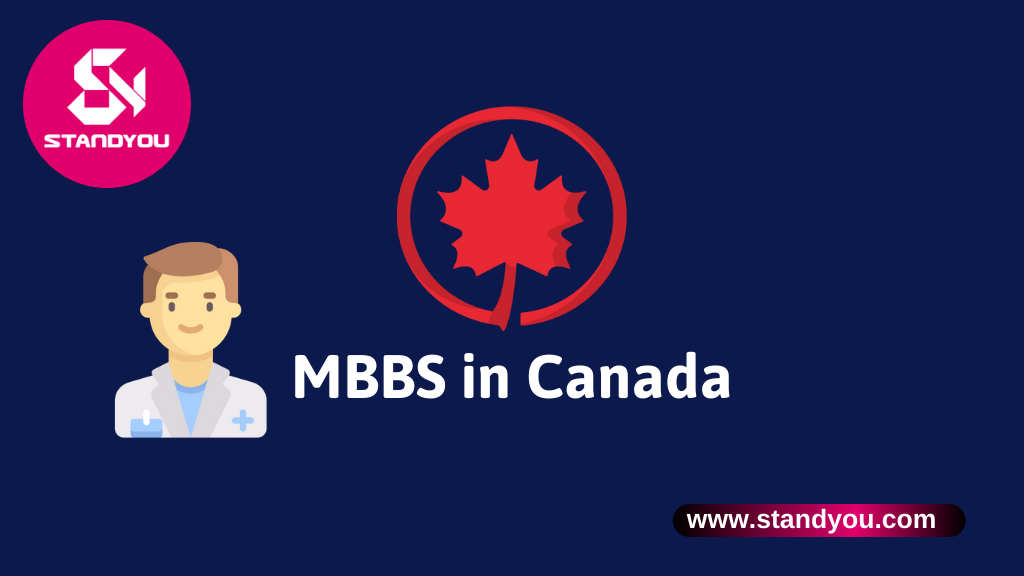Check out all the details about MBBS from Canada like Fees, Top Medical Universities, eligibility etc. ....

Jan 26, 2020 12:39:19

Canada is located in the continent of North America and shares its southern border with the US. In terms of area, Canada is the second-largest country in the world, following Russia.
Ottawa is Canada’s capital while Toronto is the largest city in Canada.
Canada has a high standard of living and a fine infrastructure across all spheres, industries, employment, and education. The number of educational universities across Canada is high, and they welcome aspirants from all corners of the globe. They come to pursue a range of degree courses from Canada.
In particular, Canada is known for its medical education and universities. Medical education across Canada is recognized for its premium standards. This is also the reason why medical education across Canada is a frequently discussed topic.
The medical education scenario in India is different from what it is in Canada. The numbers of medical aspirants are exceedingly high and the numbers of seats are limited.
It may be possible that a deserving candidate is therefore unable to get admission to a medical college. In case an Indian student fails to get an MBBS seat in an Indian medical college, it is a fine idea for a student to pursue his medical studies from Canada.
The environment for medical education in Canada, while being better than the one in India is less competitive. If a candidate meets up to the essential norms defined by a Canadian medical university, he can get admission.
Here are a few of the top medical universities across Canada for your consideration:
The students need to meet some additional requirements as well, to get admission in a medical university in Canada. They are listed below:
Let us take a look at the fees for medical education among top medical colleges in Canada:
|
Name of the University |
Yearly fee structure (INR) |
|
University Of Alberta |
14,05000 |
|
The University Of British Columbia |
31,09000 |
|
University Of Ottawa |
11,03000 |
|
University Of Calgary |
7,02000 |
|
University Of Regina |
15,04000 |
|
Dalhousie University |
17,04000 |
|
Thompson Rivers University |
8,04000 |
|
Simon Fraser University |
12,01000 |
If a student intends to pursue his MBBS studies from a medical university in Canada, it calls for financial planning on behalf of his family. Proof of the availability of sufficient funds would need to be furnished before Citizenship and Immigration Canada (CIC). They are likely to check the cost of living estimate delivered by the student’s university.
In case the student’s college offers no such estimate, the student would be required to validate the availability of $10,000 for the following 12 months. This includes the amount spent on food, accommodation, books, transportation, and clothing.
Healthcare in Canada is expensive, and it is recommendable for students to buy medical insurance, in the very first week following arrival in Canada. On-campus accommodation, while being more expensive makes commutation hassle-free. Similarly, living in Toronto is going to be more expensive as compared to living in suburban areas. Tuition and hostel fees vary from one college to another. Total expenses characteristically come in the line of $1320 monthly and $26,340 yearly. If we include tuition fees as well, a student is likely to spend in between $40,000 to $50,000 yearly.
It is beyond doubt that in terms in terms of medical education, Canada is a highly advanced nation. It is considered to be a premier destination for medical education.
However, the fee structure in Canadian medical universities is towards the higher side as compared to medical education in other countries. This is justifiable by the standard of medical education provided in Canadian universities.
Still, if one comes to figure out that the fees for medical education in Canadian medical universities is unaffordable, then, one may be required to consider other options.
In Canadian medical universities, there are a limited number of seats available for international medical aspirants. The ones that are made available have a reasonably high fee structure.
Similarly, the eligibility criteria set down by Canadian medical universities are more difficult to be met, as compared to the one set by other overseas universities.
Ultimately, studying medicine in Canada is a fine option, if the parents want their children to settle down in Canada and work as doctors. The fee structure can become more manageable for the students if they apply for the various scholarship programs offered by Canadian universities.
In case one is interested in completing his medical studies from Canada, the admissions are through each year by July.
A student must be at least 17 years old when he takes admission to a Canadian medical university. He must produce a proof for the date of birth.
He must have passed out at least 10 + 2, from a recognized board.
He should have had Physics, Chemistry, and Biology as the mandatory subjects in class XII.
The student must qualify for the Medical College Admission Test (MCAT), the Canadian medical college entrance examination which is mandatory.
Canadian medical universities expect students to be proficient in English. Hence the student must qualify for the TOFEL or IELTS with at least ninety percentile marks.
Let us now consider the eligibility criteria for admission to a Canadian university in more detail:
Canadian medical universities do not make any undergraduate MBBS programs available in Canada itself. Overall, no course is made available for the students directly after completing schooling, or 10 + 2. Instead, the course that is provided is an MD course.
To qualify for the MD course, a student must have a Bachelor’s or an undergraduate degree from any of the recognized universities.
A few of the medical programs in Canada last for 3 years while others last for 5 years. The defining factors for the duration of the course are the university in which a student enrolls, and the student’s educational background.
For the students who apply without prior science degrees, the first year is frequently the preparatory year. The course duration is characteristically 5 years.
A language proficiency test in English is one of the basic eligibility requirements for doing an MBBS from Canada. Fluency in English has been mandated by each of the Canadian medical universities. The underlying reason is the quality of education provided in Canadian medical universities. It calls for a student to be possessed with the relevant degree of competency.
For validating their language proficiency, a student may choose to appear for the IELTS or the TOFEL test. To qualify for an undergraduate course, a student must get a minimum score of 6.5 in the IELTS test. Similarly, to qualify for a post-graduate course, a student must get a score of at least 7.
For the TOFEL test, the qualifying scores for undergraduate and postgraduate courses are 80 and 90 respectively.
Completing an undergraduate science course is among the basic requirements to directly enroll for an MBBS degree in Canada. In many Canadian medical universities, the students access direct admission, based upon their academic performance.
In case a student wants to enroll without possessing a bachelor’s degree, he must attempt to enroll in Quebec’s medical schools. 10 + 2 and a 1-year diploma course in CEGEP are however essential.
In Western Canada, a 2-year bachelors’ degree is essential for studying medicine.
MCAT is the Medical College Admission Test. It is the basic entrance examination that screens MBBS applications and helps get admission in Canadian medical colleges. There are some exceptions to the rules, however. Northern Ontario School of Medicine does not require a student to qualify MCAT for an MBBS admission.
One of the top reasons why Canada is a preferable option for pursuing medical studies from overseas is that the international students are granted generous scholarships. Both, government and non-government scholarships are made available.
The government scholarships include Canada graduate scholarships and NSERC postgraduate scholarships. Similarly, the non-government scholarships are Canadian Rhodes Scholars Foundation scholarship and Trudeau scholarships and fellowships.
A few of the most popular scholarships offered by Canadian universities include:
Vanier Canada Graduate Scholarship
University of Waterloo International Master’s and Doctoral Awards
Ontario Graduate Scholarship
The scholarships are frequently merit-based and come in the form of financial rewards. Both, partial and full scholarships are made available. They are variable in range from $1,000 to $40,000. A remarkable scholarship among those available is the Vanier Canada Graduate Scholarships. It is a merit-based scholarship that has a value of up to $50,000 yearly.
The three Canadian medical universities approved by MCI are Jimma University, Royal College of Physicians and Surgeons of Canada and St Matthews University School of Medicine.
The advantage of studying in an MCI approved college is that a student does not face problems with practicing medicine in India. If an Indian student opts for a Canadian medical university other than the three mentioned, he would not be able to practice medicine in India.
Fine work opportunities in Canada are on the horizon for Indian medical students who pass out from Canadian medical universities. Many other countries recognize Canadian medical degrees as well. By studying medicine in Canada, an Indian student can make the best of these opportunities.